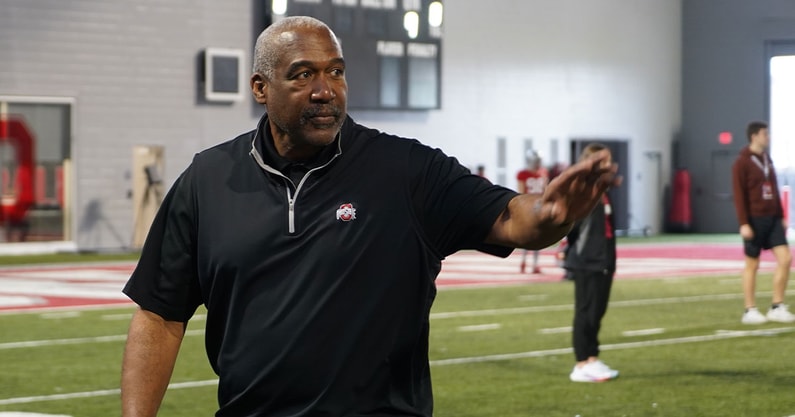Ohio State athletic director Gene Smith endorses bipartisan Student Athlete Level Playing Field Act

A Power 5 athletic director and college sports leader has thrown his weight behind the latest piece of NIL legislation.
Ohio State athletic director Gene Smith has endorsed the bipartisan Student Athlete Level Playing Field Act, which was released Wednesday by Ohio Representatives Mike Carey and Greg Landsman. Calling for a federal standard for name, image and likeness, the legislation would create an FTC clearinghouse for every endorsement deal over $500.
Initially introduced by Rep. Anthony Gonzalez in April 2021, the draft was revised to include the NIL clearinghouse. Athletes and agents would be required to disclose deals surpassing $500 in value within 72 hours of the agreement being signed.
The legislation would ban recruiting inducements while ensuring athletes are not considered employees of universities. The NCAA has been pushing for for a piece of federal legislation that would give oversight power in college athletics’ new market of endorsements and collectives.
The Level Playing Field bill would nullify any work states have accomplished. The draft specifically outlines that “no state may enforce a state law or regulation” regarding an endorsement or agency contract in college athletics.
SEC commissioner Greg Sankey and Alabama head coach Nick Saban have been publicly involved in Sens. Tommy Tuberville and Joe Manchin drafting of NIL legislation. But Smith is one of the first athletic directors to throw his name behind a bill.
“I’m pleased that student-athletes now have the opportunity to benefit from their name, image and likeness,” Smith said in a statement. “At Ohio State, our NIL programming assists student-athletes as they capitalize on their hard work, generate income for necessary expenses, and learn marketing and financial literacy skills. However, NIL laws and regulations remain inconsistent from state to state. Representative Carey’s work to bring forth consistent, national NIL regulations will further protect student athletes and bring order to NIL policies and procedures nationwide. On behalf of Ohio State, I want to thank Representative Carey for this significant and important legislation.”
The Big Ten’s longest-tenured athletic director has been a proponent of college football moving under the CFP umbrella and away from the NCAA. Smith openly campaigned for more institutional involvement in NIL a year ago, citing the need to reign in recruiting inducements. The bill produced by Carey and Landsman does that, while providing some protections for the instiution.
States across the country, including Arkansas, Colorado, Missouri, Montana, New York, Oklahoma and Texas, have recently passed or proposed reform squarely aimed at bypassing NCAA NIL oversight.
Breakdown of Student Athlete Level Playing Field Act
The Student Athlete Level Playing Field Act calls for the establishment of the Covered Athletic Organization Commission. The group would make recommendations to congress and be charged with “recognizing credentialed athlete agents.” The 13-member commission would consist of athletic directors, administrators, coaches, former athletes and sports marketing professionals. Members would be appointed by leaders in the House and Senate.
Top 10
- 1New
Michigan football
Ex-coaches get show-causes
- 2Hot
Shedeur Sanders
On CFL negotiation list
- 3
Greg McElroy
Polarizing Top 10 QB ranking
- 4Trending
CFB Top 25
Post-spring rankings
- 5
Shaquille O'Neal
Takes CBB GM job
Get the On3 Top 10 to your inbox every morning
By clicking "Subscribe to Newsletter", I agree to On3's Privacy Notice, Terms, and use of my personal information described therein.
The Federal Trade Commission would be expected to create a program to register agents who work with student-athletes, too. Agents would be forced to register through the FTC before entering into working relationships with athletes.
The bill would provide some protections to athletes, including prohibiting institutions from limiting participating as a retaliation for an NIL deal or agency agreement.
Universities would have the power, however, to regulate what apparel athletes wore during games. If an athlete had a relationship with a major sportswear brand that was not a sponsor of the institution, the athletic department could deny them from wearing the apparel. It’s a situation that has played out at LSU, where freshman Flau’jae Johnson had a deal with Puma but LSU is a Nike school.
Gene Smith backing does not guarantee much on Hill
Smith obviously believes in the Student Athlete Level Playing Field Act. Vouching for the bill lines up with his beliefs in institutions playing a role in regulating NIL. It also makes it significantly harder for agents operating in the college athletics space to operate under the radar, something institutions and collectives have voiced as problematic.
The chances of this moving forward remain slim, though. Not a single bill dealing with NIL in the past four years has gone to a vote. The legislation calls for a statue to preempt state laws, however, it could still run into states’ rights of publicity.
Democrats and Republicans continue to remain far apart on much of the language being introduced in these bills. One of the main arguments between the two parties has been over classifying athletes as employees. The clock is starting to tick on meaningful legislation passed by Congress. The 2024 election cycle is starting to pick up and party lines will surely be drawn for good by this fall or winter.
One thing is clear: The NCAA is doing everything possible to create movement on Capitol Hill. True results do not appear to be coming. But new NCAA president Charlie Baker is doing everything he can to push for legislation to be enacted.
Gene Smith is the latest college athletics leader to jump in the fight.